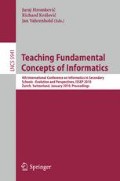Abstract
Teaching introductory object-oriented programming presents considerable challenges. Some of these challenges are due to the intrinsic complexity of the subject matter — object-oriented concepts are tightly interrelated and appear in many combinations. The present work describes an approach to modeling educational domains and reports on the results for object-orientation. It analyzes the dependency structure of object-oriented concepts and describes the implications that the high interrelatedness of concepts has on teaching introductory programming.
Access this chapter
Tax calculation will be finalised at checkout
Purchases are for personal use only
Preview
Unable to display preview. Download preview PDF.
References
McGettrick, A., Boyle, R., Ibbett, R., Lloyd, J., Lovegrove, G., Mander, K.: Grand Challenges in Computing: Education A Summary. The Computer Journal 48(1), 42–48 (2005)
Bennedsen, J., Caspersen, M.E., Kölling, M.: Reflections on the Teaching of Programming. Springer, Heidelberg (2008)
Linn, M.C., Dalbey, J.: Cognitive consequences of programming instruction. Studying the Novice Programmer, pp. 57–81. Lawrence Erlbaum Associates, Mahwah (1989)
Pedroni, M., Oriol, M., Meyer, B.: A framework for describing and comparing courses and curricula. SIGCSE Bull. 39(3), 131–135 (2007)
Meyer, B.: Testable, reusable units of cognition. IEEE Computer 39(4), 20–24 (2006)
Pedroni, M., Oriol, M., Meyer, B., Albonico, E., Angerer, L.: Course management with TrucStudio. In: ITiCSE 2008: Proceedings of the 13th annual conference on Innovation and technology in computer science education, pp. 260–264. ACM, New York (2008)
Armstrong, D.J.: The quarks of object-oriented development. Commun. ACM 49(2), 123–128 (2006)
Sanders, K., Boustedt, J., Eckerdal, A., McCartney, R., Moström, J.E., Thomas, L., Zander, C.: Student understanding of object-oriented programming as expressed in concept maps. SIGCSE Bull. 40(1), 332–336 (2008)
Novak, J.D., Cañas, A.J.: The theory underlying concept maps and how to construct them. Technical report, IHMC CmapTools, Florida Institute for Human and Machine Cognition (January 2006)
Schulte, C., Bennedsen, J.: What do teachers teach in introductory programming? In: ICER 2006: Proceedings of the second international workshop on Computing education research, pp. 17–28. ACM, New York (2006)
Milne, I., Rowe, G.: Difficulties in learning and teaching programming - views of students and tutors. Education and Information Technologies 7(1), 55–66 (2002)
Dale, N.: Content and emphasis in CS1. SIGCSE Bull. 37(4), 69–73 (2005)
The Joint Task Force on Computing Curricula: Computing Curricula 2001 (final report). Technical report, ACM and IEEE (December 2001), http://www.acm.org/sigcse/cc2001
Gries, D.: A principled approach to teaching OO first. SIGCSE Bull. 40(1), 31–35 (2008)
Shultz, G.: Using a restricted subset of Java in the first part of CS1. J. Comput. Small Coll. 23(1), 212–218 (2007)
Schwill, A.: Fundamental ideas in computer science. Bulletin European Association for Theoretical Computer Science 53, 274–295 (1994)
Meyer, B.: The outside-in method of teaching introductory programming. In: Broy, M., Zamulin, A.V. (eds.) PSI 2003. LNCS, vol. 2890, pp. 66–78. Springer, Heidelberg (2004)
Pedroni, M., Meyer, B.: The inverted curriculum in practice. In: SIGCSE 2006: Proceedings of the 37th SIGCSE technical symposium on Computer science education, pp. 481–485. ACM Press, New York (2006)
Bennedsen, J., Caspersen, M.: Model-Driven Programming. In: Reections on the Teaching of Programming, pp. 116–129. Springer, Heidelberg (2008)
George, C.E.: Erosi – visualising recursion and discovering new errors. SIGCSE Bull. 32(1), 305–309 (2000)
Hristova, M., Misra, A., Rutter, M., Mercuri, R.: Identifying and correcting Java programming errors for introductory computer science students. SIGCSE Bull. 35(1), 153–156 (2003)
Meyer, B.: Object-Oriented Software Construction, 2nd edn. Prentice-Hall, Englewood Cliffs (1997)
Meyer, B.: Touch of class: Learning to program well with objects and contracts. Springer, Heidelberg (2009)
Ng Cheong Vee, M.-H., Meyer, B., Mannock, K.L.: Empirical study of novice errors and error paths in object-oriented programming. In: 7th Annual HEA-ICS conference, Dublin, Ireland (2006)
Ragonis, N., Ben-Ari, M.: On understanding the statics and dynamics of object-oriented programs. SIGCSE Bull. 37(1), 226–230 (2005)
Author information
Authors and Affiliations
Editor information
Editors and Affiliations
Rights and permissions
Copyright information
© 2010 Springer-Verlag Berlin Heidelberg
About this paper
Cite this paper
Pedroni, M., Meyer, B. (2010). Object-Oriented Modeling of Object-Oriented Concepts. In: Hromkovič, J., Královič, R., Vahrenhold, J. (eds) Teaching Fundamentals Concepts of Informatics. ISSEP 2010. Lecture Notes in Computer Science, vol 5941. Springer, Berlin, Heidelberg. https://doi.org/10.1007/978-3-642-11376-5_15
Download citation
DOI: https://doi.org/10.1007/978-3-642-11376-5_15
Publisher Name: Springer, Berlin, Heidelberg
Print ISBN: 978-3-642-11375-8
Online ISBN: 978-3-642-11376-5
eBook Packages: Computer ScienceComputer Science (R0)

